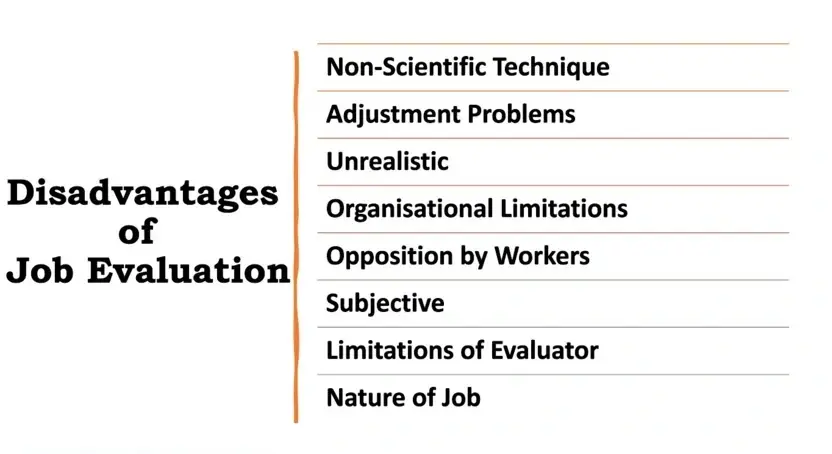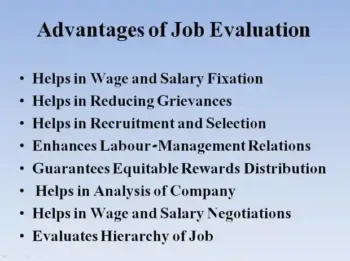Table of Contents:-
- Advantages of job evaluation
- Disadvantages of job evaluation
- Uses of job evaluation
- Limitations of Job Evaluation
There are several disadvantages and advantages of job evaluation that can benefit both employers and employees. Some of these are explained as follows:-
Advantages of job evaluation
Job evaluation can be defined as a structured and organised method of assessing jobs and classifying them according to their utility in the organization. It also helps in designing compensation plans. It generally depends upon compensation variables (skills required for job performance, working conditions and job responsibilities) instead of employees. There are several advantages of job evaluation that can benefit both employers and employees.

The advantages of job evaluation are as follows:
- Helps in Wage and Salary Fixation
- Helps in Reducing Grievances
- Helps in Recruitment and Selection
- Enhances Labour-Management Relations
- Guarantees Equitable Rewards Distribution
- Helps in the Analysis of the Company
- Helps in Wage and Salary Negotiations
- Evaluate the Hierarchy of Job
1) Helps in Wage and Salary Fixation
It assists the top management in developing a logical and consistent structure of wages and salaries by facilitating a criterion to determine the wages and salaries. Wage incentive plans are also prepared based on the job evaluation process.
2) Helps in Reducing Grievances
An organisation can make use of job evaluation programmes to reduce the disputes and grievances of workers through a systematic procedure.
3) Helps in Recruitment and Selection
Job evaluation helps in determining the need for new employees. When demand is identified, the HR department can easily match the job requirements with new employees. Hence, it makes recruitment and selection easier. It also helps in deciding the promotion and transfer of employees.
4) Enhances Labour-Management Relations
As job evaluation helps to remove inequalities in wages in the organisation, it facilitates maintaining cordial relations among employees and employers.
5) Guarantees Equitable Rewards Distribution
Every employee needs fair and reasonable payment of rewards and job evaluation helps in ensuring equitable distribution of rewards.
6) Helps in the Analysis of the Company
It acts as an important technique for organisational analysis and recognising the gaps or overlaps in duties and responsibilities.
7) Helps in Wage and Salary Negotiations
A logical base is provided by job evaluation to negotiate the wage and salary with trade unions.
8) Evaluate the hierarchy of Jobs
Job evaluation helps in determining the exact utility and hierarchy of the job in the organisation. For example, if there are three job profiles, job evaluation will determine their exact position depending on the type of organisation and relevance of each position.
Uses of Job Evaluation
Job evaluation is the cornerstone of wage and salary administration as it plays an important role in determining the appropriate compensation for employees. Its main uses are as follows:
(i) Job evaluation is a logical, objective, systematic and unbiased method for assessing and classifying jobs and thereby removing wage inequities. This process helps establish a fair, equitable, rational, consistent, logical, and uniform wage and salary structure.
(ii) It helps to improve industrial relations by reducing employee doubts and grievances arising out of wages. It increases employee satisfaction differentials.
(iii) Evaluation of the job provides a clear and objective basis for collective bargaining and wage negotiations.
(iv) It helps in fitting new jobs at their appropriate places in the existing wage structure.
(v) Job evaluation simplifies wage administration by promoting uniformity in wage rates.
(vi) It facilitates job redesign by evenly distributing both easy and difficult tasks equally among different jobs.
(vii) It reveals jobs that demand either less or more skilled workers than those already performing these jobs. In this way, job evaluation facilitates better utilisation of the workforce, leading to enhanced productivity and efficiency.
(viii) Due to increasing mechanisation and automation, performance depends in many cases more on the machine than on the worker. In such cases, it is realistic to pay workers based on their output. Job evaluation is a realistic basis for wage fixation in these cases.
(ix) Job evaluation invariably involves a detailed analysis of a job. Data generated in job evaluation is very useful in the selection, placement and training of employees.
Disadvantages of Job Evaluation
The disadvantages of job evaluation are as follows:

- Non-Scientific Technique
- Adjustment Problems
- Unrealistic
- Organisational Limitations
- Opposition by Workers
- Subjective
- Limitations of Evaluator
- Nature of Job
1) Non-Scientific Technique
It is not a scientific but a systematic method of rewarding the job. It does not produce results with scientific precision because it is very difficult to assess each and every factor accurately.
2) Adjustment Problems
Although different ways are available to apply the techniques of job evaluation, rapid technological changes and supply and demand of some spills have resulted in adjustment problems.
3) Unrealistic
There are considerable variations between the job factors and the factors being focused on in the market. These variations are wider in such cases where the average pay given by the organisation is lower than the current pay in other organisations, for the same position in the same industry, or in the same geographical region.
4) Organisational Limitations
It is time-consuming to install the job evaluation in any organisation. In addition, it needs to be installed by experts and is expensive too.
5) Opposition by Workers
It is supposed to be a suspicious tool by the trade union of the organisations because it relies upon some set of principles and usually, ignores the outcomes. Certain methods of job evaluation are not easy to understand. Thus, workers usually fear that the job evaluation method will eliminate collective bargaining.
6) Subjective
Several factors are used in evaluating jobs but there is no standard list of factors to be considered. The definition of factors varies from company to company. Various types of research depict that factors utilised in job evaluation are not given due consideration or individual importance. There is more dependency on internal standards and assessment of wage rate fixation.
7) Limitations of Evaluator
In case, if the methods and principles of job evaluation are not well-known to the evaluator, job evaluation is supposed to produce inconsistent outcomes. In addition, if the evaluator is biased toward any specific job, he will give more weight to that job.
8) Nature of Job
It is a presumption that jobs that hold equal value are equally pleasing is not true. If a job offers to all workers, but good future prospects, it will succeed in attracting more people.
Limitations of Job Evaluation
Job evaluation suffers from the following weaknesses:
(i) Job Evaluation is not fully objective and scientific. There is considerable scope for subjective judgement and human error. There is no standard list of factors to be considered and some job factors cannot be precisely quantified.
(ii) Job evaluation fails to consider several factors that influence the value of a given job from the workers’ point of view. Demand and supply of a particular skill, security of service, career prospects, social status, nature of supervision. etc. are such factors.
(iii) Job evaluation can lead to an inflexible wage and salary structure by freezing wage differentials between various job positions. This inflexibility often hampers the ability to adapt to prevailing wage rates and changing conditions.
(iv) Job evaluation is not well suited to determining the relative worth of managerial jobs. These jobs involve considerable planning, decision making and supervision of others. These executive skills cannot be measured quantitatively.
(v) Some methods of job evaluation are difficult to understand. Workers and trade unions often oppose job evaluation. They fear that it will do away with collective bargaining for the settlement of wage rates.
(vi) Job evaluation is a time-consuming and expensive process. As job contents change revaluation of jobs becomes necessary. Moreover, job standardisation essential for proper evaluation may be difficult under changing conditions.
Some more limitations are:
(vii) Though there are many methods for implementing job evaluation techniques, the rapid changes in technology and fluctuations in the demand and supply of specific skills have given rise to problems of adjustment. It is imperative to investigate and address these issues.
(viii) Substantial differences exist between job-related factors and market-leading factors. These differences are wider in cases in which the average pay offered by a company is lower than that prevalent in other companies in the same industry or the same geographical area.
(ix) Job evaluations often result in favouring different groups compared to those favoured by the market. This observation was made by Kerr and Fisher, who observed that “jobs which tend to rate high as compared with the market are those of janitor, nurse and typist, while craft rates are relatively lower. Weaker groups are better served by an evaluation plan than by the market; the former places the emphasis not on force but on equity.”
(x) Job factors fluctuate because of changes in production technology information systems, division of labour and other factors. Therefore, the evaluation of a job today is made based on job factors and does not reflect the time job value in future. In other words, continuing attention and frequent evaluation of jobs are important.
(xi) When job evaluation is implemented for the first time in any organization, it creates doubts and fears in the minds of those employees whose jobs are being evaluated. This process can affect existing social and psychological relationships adversely within the workplace.
Related Questions:-
What are the merits of job evaluation?
List some of the advantages of job evaluation.
What are the disadvantages of job evaluation?
What are the advantages and disadvantages of job evaluation?
You May Also Like:-
Methods of Management Development
Workers Participation in Management
Features of Management Development
Human Resource Development Mechanisms
Process of Human Resource Planning
360 Degree Performance Appraisal
Limitations of Human Resource Planning
Difference between Personnel Management and HRM
